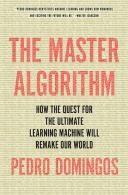Книга: The Master Algorithm: How the Quest for the Ultimate Learning Machine Will Remake Our World
Epilogue
Epilogue
So now you know the secrets of machine learning. The engine that turns data into knowledge is no longer a black box: you know how the magic happens and what it can and can’t do. You’ve met the complexity monster, the overfitting problem, the curse of dimensionality, and the exploration-exploitation dilemma. You know in broad outline what Google, Facebook, Amazon, and all the rest do with the data you generously give them every day and why they can find stuff for you, filter out spam, and keep improving their offerings. You’ve seen what’s brewing in the world’s machine-learning research labs, and you have a ringside seat to the future they’re helping to bring about. You’ve met the five tribes of machine learning and their master algorithms: symbolists and inverse deduction; connectionists and backpropagation; evolutionaries and genetic algorithms; Bayesians and probabilistic inference; analogizers and support vector machines. And because you’ve traveled over a vast territory, negotiated the border crossings, and climbed the high peaks, you have a better view of the landscape than even many machine learners, who toil daily in the fields. You can see the common themes running through the land like an underground river, and you know how the five master algorithms, superficially so different, are really just five facets of a single universal learner.
But the journey is far from over. We don’t have the Master Algorithm yet, just a glimpse of what it might look like. What if something fundamental is still missing, something all of us in the field, steeped in its history, can’t see? We need new ideas, and ideas that are not just variations on the ones we already have. That’s why I wrote this book: to start you thinking. I teach an evening class on machine learning at the University of Washington. In 2007, soon after the Netflix Prize was announced, I proposed it as one of the class projects. Jeff Howbert, a student in the class, got hooked and continued to work on it after the class was over. He wound up being a member of one of the two winning teams, two years after learning about machine learning for the first time. Now it’s your turn. To learn more about machine learning, check out the section on further readings at the end of the book. Download some data sets from the UCI repository (archive.ics.uci.edu/ml/) and start playing. When you’re ready, check out Kaggle.com, a whole website dedicated to running machine-learning competitions, and pick one or two to enter. Of course, it’ll be more fun if you recruit a friend or two to work with you. If you’re hooked, like Jeff was, and wind up becoming a professional data scientist, welcome to the most fascinating job in the world. If you find yourself dissatisfied with today’s learners, invent new ones-or just do it for fun. My fondest wish is that your reaction to this book will be like my reaction to the first AI book I read, over twenty years ago: there’s so much to do here, I don’t know where to start. If one day you invent the Master Algorithm, please don’t run to the patent office with it. Open-source it. The Master Algorithm is too important to be owned by any one person or organization. Its applications will multiply faster than you can license it. But if you decide instead to do a startup, remember to give a share in it to every man, woman, and child on Earth.
Whether you read this book out of curiosity or professional interest, I hope you will share what you’ve learned with your friends and colleagues. Machine learning touches the lives of every one of us, and it’s up to all of us to decide what we want to do with it. Armed with your new understanding of machine learning, you’re in a much better position to think about issues like privacy and data sharing, the future of work, robot warfare, and the promise and peril of AI; and the more of us have this understanding, the more likely we’ll avoid the pitfalls and find the right paths. That’s the other big reason I wrote this book. The statistician knows that prediction is hard, especially about the future, and the computer scientist knows that the best way to predict the future is to invent it, but the unexamined future is not worth inventing.
Thanks for letting me be your guide. I’d like to give you a parting gift. Newton said that he felt like a boy playing on the seashore, picking up a pebble here and a shell there while the great ocean of truth lay undiscovered before him. Three hundred years later, we’ve gathered an amazing collection of pebbles and shells, but the great undiscovered ocean still stretches into the distance, sparkling with promise. The gift is a boat-machine learning-and it’s time to set sail.
- Prologue
- CHAPTER ONE: The Machine-Learning Revolution
- CHAPTER TWO: The Master Algorithm
- CHAPTER THREE: Hume’s Problem of Induction
- CHAPTER FOUR: How Does Your Brain Learn?
- CHAPTER FIVE: Evolution: Nature’s Learning Algorithm
- CHAPTER SIX: In the Church of the Reverend Bayes
- CHAPTER SEVEN: You Are What You Resemble
- CHAPTER EIGHT: Learning Without a Teacher
- CHAPTER NINE: The Pieces of the Puzzle Fall into Place
- CHAPTER TEN: This Is the World on Machine Learning
- Epilogue
- Acknowledgments
- Further Readings
- Index
- Pedro Domingos
- Содержание книги
- Популярные страницы




